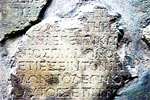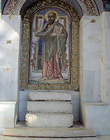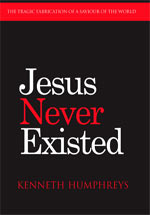Be afraid
"For the weapons of our warfare are casting down imaginations ... and bringing into captivity every thought to the obedience of Christ."
– St Paul, 2 Corinthians 10.4,5.
Paul? Paul who?
Paul?
The writer of the Revelation of St John – one of the earliest books of the New Testament and in origins probably the only one to date from the 1st century – addresses his end of the world gore-fest to the very region central to Paul's mission, Roman Asia.
The "seven churches" of the preface were Ephesus (where "Paul caused a riot" and lived for 3 years), Thyatira (home town of Lydia, Paul's first convert in Philippi), Laodicea (sent a copy of Colossians, we are told), Sardis, Philadelphia, Pergamum and Smyrna.
Yet the writer of the apocalypse betrays no knowledge of the activities of the apostle Paul or of his letters. Though "John" relishes the martyrdom of the saints, Paul's "execution in Rome" does not get a mention.
Similarly, the earliest reliable Christian source, Justin Martyr, in the mid-2nd century, has nothing to say of Paul or his epistles.
Paul?
"It was unfortunate that Marcion had made himself the champion of Paul. Paul's letters composed more than half of his new Scripture.
This is the explanation of the curious reticence about Paul that characterizes Justin in the two works of his that have come down to us: the Apology and the Dialogue. He uses Paul freely in them, it is true, but never once mentions his name."
– Edgar J. Goodspeed, An Introduction to the New Testament, 1937, xxi.
Three Fables
Acts mentions Paul's whereabouts at a string of Aegean ports (
). Paul himself mentions only 3 of them (
) and only two of the "seven churches of Asia" named in Revelation (
).
Paul "writes" to three churches of the Lycos valley which are unknown to Acts. But although Paul supposedly lived for years at Ephesus, the great missionary never made the 100 mile trip to visit them.
All very curious – and clearly indicative of three separate stories.
Quoted by others?
Codex Alexandrinus. Earliest 1 Clement – a 5th century copy.
The shadowy Clement of Rome, at best, refers to a single epistle of Paul.
Prior to 2nd century heretic Marcion we enter a void in which Paul's epistles are unquoted and Christian writers show no knowledge of the apostle.
Today's Christian apologists quote "early attestations" of St Paul but they are pressed into using sources which are themselves suspect.
Even more epistles: the Ignatians
The Ignatian epistles vouch for the existence of Paul and his letters. Unfortunately, the Ignatians are themselves late 2nd century forgeries.
The supposed celebrity tour of the early 2nd century bishop of Antioch as he journeyed towards his martyrdom in Rome is almost Pythonesque in its surreal character.
Dating Paul
(École Francaise d'Archéologie, Athens).
The "Gallio Inscription" – a letter set in stone from Emperor Claudius (41-54) to the citizens of Delphi.
The inscription is the bedrock for dating a historical Paul, and indeed the entire New Testament. Yet Paul himself, in his epistles, makes no mention of Gallio.
Temple goes up in flame
"So Titus retired into the tower of Antonia, and resolved to storm the temple the next day, early in the morning, with his whole army, and to encamp round about the holy house. But as for that house, God had, for certain, long ago doomed it to the fire; and now that fatal day was come ..."
– Josephus, Wars 6.4.5.
Alternative sourcing?
Apollonius of Tyana
By far the longest biography that survives from antiquity is actually the Life of Apollonius of Tyana.
The work of Flavius Philostratus, a 2nd/3rd century Greek Sophist, the biography has long fuelled the debate on the origins of the Jesus story. Apollonius was a 1st century "holy man" famed for wisdom and healing.
But the life of the wandering Pythagorean parallels much that is claimed for the apostle Paul, in particular his legendary travels across the known world. Moreover, Apollonius wrote numerous letters – some of which still survive – expressing his ethical guidelines.
Not only did Apollonius spend time in "Paul's" cities of Antioch, Ephesus and Athens, he also faced charges in Rome before the emperor Domitian.
"Paul was here"
Remarkable as it may seem, the Greek Orthodox Church at Veria (ancient Beroea, Macedonia) can vouch that these are the very steps from which St Paul preached the word. Hmm.
"When the Jews of Thessalonica had knowledge that the word of God was proclaimed of Paul at Beroea also, they came thither likewise, stirring up and troubling the multitudes."
– Acts 17.13.
|
The Six "Authentic" Pauline epistles? With 15 letters demonstrably fake and with the practice of pseudepigraphy clearly at the heart of the entire corpus of the New Testament, caution is advised before accepting the remainder of the epistles as genuine. But it is possible that half a dozen authentic letters keep company with a collection of fakes. But are they authentic?
Galatians
As to Paul's movements, we learn of Arabia, Damascus, a brief trip to Jerusalem, Syria and Cilicia. In Judaea he was "unknown by face" but they "glorified God" in him. The locations scarcely add up to great missionary activity. The epistle does not directly confirm Paul was ever in Galatia but that is implied by certain verses and his peeved response to recent events:
1 Corinthians
Was he ever in Corinth? Verses 2.1-4 say as much. The writer confesses he "came .. not with enticing words or wisdom" but only the "testimony of God". As in Galatia, the new converts are misbehaving and Paul is full of holy indignation at their independent spirit and temerity in forming different sects. The writer vents his fury at a whole number of targets – so much so that the "letter" may be a composite of several missives. Among matters eliciting his ire are Greek wisdom (aka "vanity") and the perceptions of the "natural man" (2.14); those who say "there is no resurrection of the dead" – 15.12; carnality and incest ("put away that wicked person" (5.13); "The body is not for fornication" – 6.13); women (the notorious "it is a shame for women to speak in the church" – 14.35); attendance of the Lord's supper in order to eat! – 11.20,22); actions brought in the secular courts ("The saints shall judge the world" – 6.2); and excessive use of "tongues". The conceited Paul, of course, is better with tongues than anybody else:
Who are these needy saints? Does this reference imply that the Jewish temple still functioned and that the epistle is pre-70 AD, as some claim? Paul himself provides the answer:
The writer introduces several characters unknown to Acts – Chloe (the whistle-blower from Corinth), Stephanas ("addicted to the saints"), Gaius, Fortunatus (could this be a freedman of Herod Agrippa lifted from Josephus's Antiquities, 18.7?), Achaicus – and two others, Crispus and Sosthenes, both "chief ruler of the synagogue" in Acts, though Paul says nothing of this. The polemical response to so many "issues" is a tour de force but cuts the epistle free of any certain historicity. Could anyone really expect to heal several major fractional splits with such a rambling, composite letter? If Paul was so soon to visit the Corinthians would not commonsense dictate holding his counsel until he could judge the situation first hand? Is the epistle really addressed to the Corinthians or to "all that in every place call on the name of Jesus Christ"? (1.2). Is it Paul's arrogance that leads him to write to the "whole world" – a Paul who cannot even maintain authority over his "own" churches – or is the hand of a later editor revealed? Could any apostle re-establish waning authority by sending a missive by a sidekick (Timotheus) who he fears will be "despised" because the more experienced man (Apollos) simply refuses to go? (16.11,12). Something is not quite kosher with 1 Corinthians.
2 Corinthians
The troubled apostle is moved to send a team of trusted lieutenants to sort out the errant Corinthians. Paul credits Silvanus and Timothy with sharing the earlier evangelical work (1.19), though in fact Silvanus (aka Silas) went unmentioned in 1 Corinthians. But now, a more valued new man has entered the scene, Titus, "my partner and fellow worker" (8.23), who is referred to in eight different verses and appears to arrive from Corinth.
Titus is sent back to Corinth by Paul (12.18) although we are also told Titus goes "on his own accord" (8.17). Either way, his mission is to make the Corinthians an offer they can't refuse:
Curiously, Titus has with him two "heavyweights" – an unnamed "brother whose praise is in the gospel throughout all the churches" and an unnamed "brother whom we have oftentimes proved diligent" (8.18.22). Who are these enigmatic characters, one wonders?
The Macedonian Letters Was Paul not a first generation apostle of the Lord, teaching an original revelation of the Jesus gospel? How likely is it then, that in one of his earliest letters, he would refer to the "traditions" – a word redolent of Roman Catholicism and a much later period? But such we read in 2 Thessalonians:
The "second edition" Thessalonians – shorter, formal, and void of any personal or concrete references – makes clear that the Lord's coming will be after "the working of Satan with all power and signs and lying wonders" (2.9). 1 Thessalonians has its own element of unreality. Paul greets the Thessalonians as exemplars for practically the whole world:
There is a suspicious appeal "to love those over you and who admonish you" at verses 5.12,13. The remainder of the letter waxes lyrical on the imminent day of the Lord and return of the dead ("we which are alive and remain shall be caught up together with them in the clouds, to meet the Lord in the air" - 4.17), an end-time enthusiasm which prompts the corrective of 2 Thessalonians. Whatever else we are dealing with here, it is not history. All the elements of the two letters suggest 2nd century creative theology at work.
Romans How likely is it that, in the mid-years of the 1st century, the faith of Christians in Rome was a marvel across the world? And yet such is the preposterous claim in the Epistle to the Romans.
In Romans Paul provides little "biographical" detail, but enough to identify an intolerant bigot, tormented by his "uncontrollable flesh".
In chapter 11, we again have Paul proclaiming his Israelite ancestry, this time claiming descent from the tribe of Benjamin. But it is chapter 15, verses 19 to 32 which provide the "hard facts" of places and events: a mission as far as Illyricum, an intended journey to Spain, mention of "them that do not believe him" in Judaea, and collections raised in Macedonia and Achaia which the apostle intends to deliver to the "poor saints of Jerusalem". Proof that the Jerusalem community still exists and the epistle is pre-70 AD? Not so. The earliest copies of Romans ended at verse 14.23. The "biographic" infill of chapter 15 is a 2nd century fabrication!
Witnesses to Paul?
It is clear that the words of the epistles were framed by a personality who was pompous, cantankerous and "authoritative". The writer emerges as someone who is anxious to maintain his hold over an organization that he has had a hand in building. His position, it seems, is beset by rivals. His influence is threatened by numerous competitors and the ethos of a more ancient culture that does not readily succumb to his New Order. His response is to combine anger with self-pity, didactic instruction with unctuous flattery. Yet is this ecclesiastic bully "Paul" or another who speaks in his name? It cannot be the biblical Paul. His "biography", whether drawn from Acts or the epistles, is a fabric of fraud and fantasy. The attributed journeys, whether to Cyprus and Lycaonia, to Greece, or to Rome, are palpably false. Nor does the "authenticity" of Paul himself gain support from elsewhere. A potential "early witness" to the apostle, the Revelation of St John, is silent. The apocalypse is Jewish agitprop given an early Christian gloss, which addresses itself precisely to Paul's stomping ground – Roman Asia. The Revelation does mention apostles – false apostles and liars, that is – but of Paul it says nothing. The apocalypse even mentions a "faithful martyr" but this is not Paul but "Antipas" (2.13) – a saint otherwise unknown outside of Orthodox fiction. Though the Revelation has precious few words that pertain to the known universe, it does twice mention an obscure sect, the Nicolaitanes (probably Gnostics), who it seems, were hated by the divine "Alpha and Omega". But Paul, the founder of churches and apostle who bestrides the whole New Testament, does not merit a mention. There is another supposed "early witness" to the existence of Paul, Clement of Rome, whose own letter to the Corinthians mentions a single "epistle of Paul" (1 Clement 47.1). 1 Clement also provides the novel information that Paul had been "driven into exile ...(and) reached the farthest bounds of the West" (5.5,6) – adventures unconfirmed either by Acts or Paul himself! Yet "Clement" himself is something of a phantom, despite claims that he was an early "pope". His epistle is usually dated to 95 AD but the earliest extant copy (in the Codex Alexandrinus) dates from the 5th century and the earliest reference to 1 Clement is made in the 4th century history of Eusebius, a notorious fabricator (Hist. Eccl. 3,16,38; 4,22). Rather more pertinent than the ethereal Clement is the testimony of Justin Martyr, who, in the mid-2nd century, discussed the apostolic mission to the Gentiles at length. Yet Justin not once mentioned Paul or his epistles, not even when arguing the point so crucial to Paul's heart, that "circumcision was unnecessary"! Nor is there any reference to Paul in the fragments that we have of the work of Hegesippus (?110-180), a contemporary of Justin and himself a Jew. The earliest extant canon list containing all of Paul's accredited letters dates from the late 2nd century. Its author is unknown and the list takes its name from its 18th century Italian discoverer Muratori. Interestingly, the Muratorian Canon includes the comment,
But WHY? Why on earth would the true writer (or writers) want to falsely attribute authorship? And if "pseudepigraphical" like the rest of the epistles, who was the phantom-like figure "Paul"? And why was his name reverentially attached to a body of theological writings so crucial to the canon and to making sense of the mythical life and death of Jesus Christ? Without the "field correspondence", the Jesus saga might be an entertaining tale but it would have floated free of the priesthood, a class of deceivers and deluded fools who necessarily made special claim to the legacy of the dying/resurrected godman. Their self-chosen mission was to officiate the awesome power of the Lord in this world and to stand as gatekeepers on the next, dispensing promises of life eternal or curses of everlasting torment. In the fierce competition of 2nd century Christ-cults, historicizing of the godman precipitated a scramble for Christ bestowed succession. If Jesus of Nazareth had lived, to whom indeed had his mantle of earthly authority fallen? The Jewish-Christians, or Ebionites, of Jerusalem made claim to kinship: they were nothing less than the descendents of the Lord (and had not Jesus indeed had brothers and sisters?). The Catholics in Rome staked their claim on Peter, designated "rock" upon which the saviour would build his church. But another Gentile church contended with the Catholics: the Marcionites, a sect of Jesus enthusiasts far less accommodating of "Jewish ways" than their rivals. Marcion's authority, as he himself claimed, rested on an apostle even greater than Rome's St. Peter, on an apostle who had received his remit directly from the risen Christ. Miraculously, it was Marcion himself who had first "found" the epistles of Paul, letters that it seems had remained curiously forgotten for a century. Marcion, the heretic, assembled a canon even earlier than the Muratori, with ten epistles attributed to Paul and a simple Jesus tale that had a kinship to Luke's gospel. It was the first "New Testament". The Catholics responded and in the second half of the 2nd century, "epistles" – some under the name of Paul, others under the names "Ignatius", "Peter" etc. – proliferated. We know, of course, that the Catholics prevailed over their opponents. In the formulation of a single, universal, Catholic dogma, Paul, the erstwhile hero of the heretics, was written into the yarn called Acts of the Apostles, shorn of much of his self-proclaimed superiority and now with the Holy Spirit guiding his hand. When an approved canon was finally determined, the Pauline letters, assembled for lack of any known chronology by length, were tucked in behind Acts, implying an historical sequence utterly unsupported by any reality.
Sources:
'Save' a friend e-mail this page
Copyright © 2006
by Kenneth Humphreys.
|
||||||||||||||||||||||||||||||||||||||||||||||||||||









